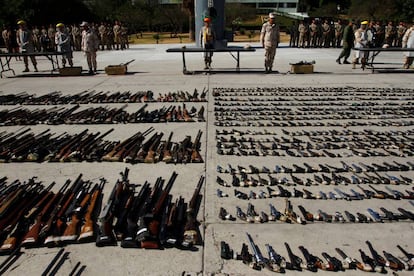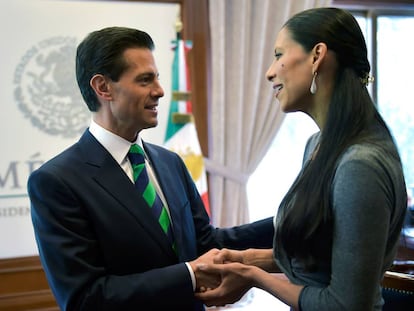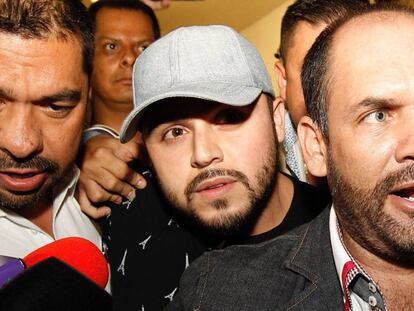July marks Mexico’s most violent month since Peña Nieto took power
Figures show more than 2,000 people were killed, a murder rate not seen since the drug wars


A worrying trend of increasing violence is continuing in Mexico. July, for example, had the dubious honor of being the month with the most murders registered in the three years and seven months that the government of President Enrique Peña Nieto has been in place. The National System of Public Security (SNSP) reported a total of 2,073 victims for the seventh month of the year, the highest figure since the administration began to include intentional homicide in its statistics in January 2014. The first seven months of the year have seen a total of 12,376 murders, a rise of nearly 16% compared to the same period last year.
The violence began to grow in May of this year, when a total of 1,895 homicides were registered, a figure that has not been seen since September 2012. June saw a slight fall, with 66 fewer cases, but the number was still high for the current administration.
The violence began to grow in May of this year, when a total of 1,895 homicides were registered
July, however, broke the 2,000-mark, according to preliminary figures from cases opened in local public ministries. Not since 2011 have there been similar numbers of victims. At the time, the government of Felipe Calderón (2006-2012) was mired in its offensive against the drug cartels. That year was the bloodiest of the then-president’s mandate, with a total of 27,213 homicides, according to official figures.
A total of 16 areas saw a rise in homicides last month, in particular in Baja California, Chihuahua, Colima, Guerrero, Michoacán, Nuevo León, Oaxaca, Tamaulipas and Veracruz. Baja California, the historical bastion of operations for the Tijuana Cartel, saw more than 110 killings, a level unseen since 2008.
Sign up for our newsletter
EL PAÍS English Edition has launched a weekly newsletter. Sign up today to receive a selection of our best stories in your inbox every Saturday morning. For full details about how to subscribe, click here
Michoacán, to the west of the capital, saw 187 murders in July, according to the SNSP. That’s the highest figure in nearly a decade. For several years the area has been a battleground for civilians who have taken up arms to fight against criminal organizations in the region. The government had focused efforts in terms of funding and security in the state, assuming that it was now pacified.
The scene in Michoacán has been repeated in other regions where drug traffickers have a hold. Tamaulipas, where over recent months two cartels have been reforming in mini-criminal organizations, saw its most violent month so far this year in July, with 106 victims – 31 more than in June.
But it is Veracruz that has seen the biggest rise in violence. The state, governed by controversial politician Javier Duarte, who has been caught up in a number of corruption scandals, saw 168 homicides in July, 68 more than the previous month. With 643 killings in the first seven months of the year, the area has already exceeded its total number of victims for 2014 (569) and 2015 (615).
If this rhythm is maintained, Mexico could reach as many as 24,000 murders a year
Specialist Alejandro Hope, who has been monitoring the situation for several years, says that the trend is worrying given that levels of violence had been falling at the end of 2012. “Today they are clearly on the up,” he wrote in El Universal.
In the first seven months of 2016 a total of 12,376 killings were registered, 1,750 more than those seen in the same period in 2015. Hope calculates that if this rhythm is maintained, Mexico could reach as many as 24,000 murders a year, taking the rate to levels not seen since the worst violence of the war against drug traffickers.
English version by Simon Hunter.
More information









































